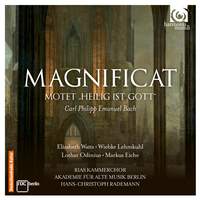Recording of the Week,
CPE Bach Magnificat
2014 marks the 300th anniversary of the birth of Carl Philipp Emanuel Bach, the fifth of Johann Sebastian Bach’s twenty children, and one of only ten to survive into adulthood. Although three of C.P.E. Bach’s brothers also became composers, Carl Philipp Emanuel is without doubt the most well-known and is credited with significant influence in the development of music from his father’s baroque style towards the classical style which followed.

C.P.E. Bach was an outstanding keyboard player, and wrote a great number of works involving harpsichord or fortepiano – solos, concertos as well as a considerable amount of chamber music. Anxious to demonstrate his craft and ability beyond just keyboard instruments and small ensembles, he wrote his first large-scale choral work in 1749 – the Magnificat, Wq. 215. It was an important work for C.P.E. Bach, and although the specific reason for its composition remains unknown, the fact that it contains nine movements of wide stylistic range perhaps suggests an audition piece. Furthermore, its first performance in his father’s church – the Thomaskirche in Leipzig – the following year (which turned out to be just months before J.S. Bach’s death) perhaps even suggests the possibility that it was composed as an audition piece to take over from his father in Leipzig.
That was not to be, as he failed in his two official applications for the role of Thomaskantor in 1750 and 1755, but nevertheless the Magnificat marked the start of a large number of choral works to be composed throughout the remainder of his life – and it clearly remained dear to C.P.E. Bach as he expanded the instrumental forces in 1779 and programmed it at an important charity concert to be performed in 1786 in Hamburg.
That very concert is the inspiration for a new disc from the RIAS Kammerchor and Akademie für Alte Musik Berlin under Hans-Christoph Rademann, where they couple the Magnificat with the two other works of C.P.E. Bach performed on that occasion – the double chorus motet ‘Heilig ist Gott’, Wq. 217 and the Symphony in D major, Wq. 183.
It is a great combination of works showcasing on a single disc great variety and also displaying a considerable amount of the craft, invention and unpredictability for which C.P.E. Bach was so much admired. The punchy and agile voices of the RIAS Kammerchor bring great vitality to the faster movements while the Akademie für Alte Musik Berlin play with clear textures and immaculate intonation throughout.
There are some really sumptuous sonorities in this music and the temptation in performance must sometimes be to overplay them. That is never the case here though, as the careful balance between expression and restraint seems very well judged throughout. The daring and unpredictability of the symphony show the orchestral players at their absolute best, relishing the opportunity to shock and surprise us just as the composer had intended.
C.P.E. Bach was much admired and popular in the years after his death, but his music fell somewhat into neglect during the 19th Century and still hasn’t yet regained the position it perhaps deserves. 2014 is the perfect opportunity to correct that, and with a number of new recordings, retrospectives and live performances all scheduled, there is likely to be much to discover and enjoy. This disc represents an ideal start to that journey of discovery.
Elizabeth Watts (soprano), Wiebke Lehmkuhl (alto), Lothar Odinius (tenor) & Markus Eiche (bass), RIAS Kammerchor & Akademie für Alte Musik Berlin, Hans-Christoph Rademann
Available Formats: MP3, FLAC



